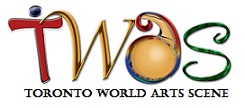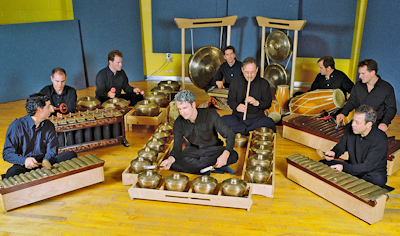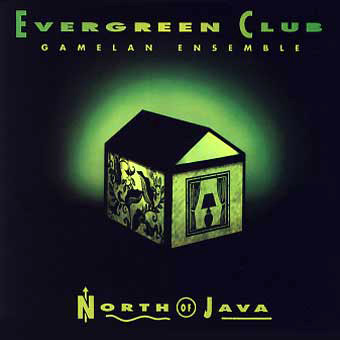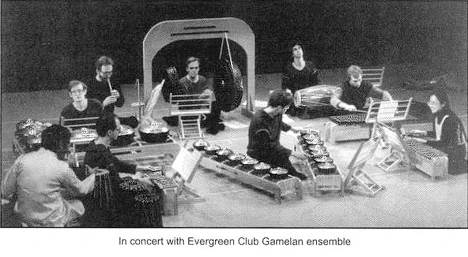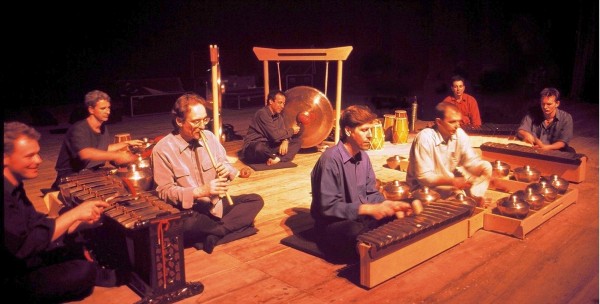COMING EVENTS – Evergreen Club Contemporary Gamelan
Evergreen Club Contemporary Gamelan: Surfers of Canada’s World Music First Wave, Toronto Group Celebrates its 30th Anniversary
Evergreen Club Contemporary Gamelan, c. 2007.
Founded in 1983, Toronto’s Evergreen Club Contemporary Gamelan (ECCG) is the first group in Canada to perform music on the kind of tuned percussion-rich orchestra called a gamelan. It’s also the first gamelan to have its music nationally broadcast on Canadian radio and TV (CBC), and to release a commercial recording of it (North of Java: 1987: LP/Cass/CD).
The home of the several dozen different types of gamelan ensembles is of course Indonesia, the world’s fourth largest country by population and the largest Islamic nation. And the type of gamelan played by ECCG is called degung considered among the musical treasures of the Sundanese culture of West Java, an ethnic group numbering some 35 million.
Back in Toronto, half way around the world from West Java, ECCG is quietly getting ready to celebrate its 30th anniversary. ECCG’s history of collaborations continues on Sunday,
November 17, 2013, when it performs with the Esprit Orchestra, Canada’s sole “orchestra devoted exclusively to performing and promoting new orchestral music,” at Koerner Hall, the Royal Conservatory of Music, Toronto. You can read more about the programme here.
The group’s musicians, all Canadians, don’t always seek out such hybrid intercultural music making however. During its first three decades various group members have engaged with degung’s home culture in various ways. They’ve studied aspects of the Sundanese degung repertoire with master musicians and composers, and also performed with them. The prominent Sundanese songwriter, composer and group leader Nano S. (1944-2010), the group’s guest artist in 2008 enthused, “it makes me very happy as a Sundanese artist to see Evergreen Club successfully taking degung music to Canada and onto the international stage.”
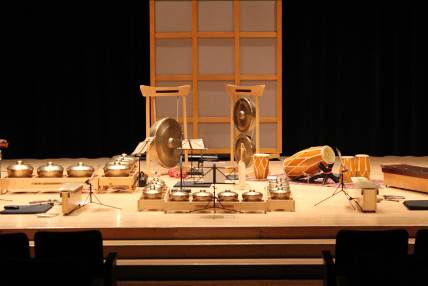
ECCG’s degung on the stage of the Glenn Gould Studio, CBC, Toronto, 2011.
ECCG has an enviable record of career achievements. It’s commissioned dozens of new works by leading North American and European concert composers, toured across Canada and internationally, and appeared on over 12 albums, on national radio and TV. Moreover the group has a commitment to educating its audience: it has conducted workshops across Canada, Europe, Japan and Indonesia. From its first season ECCG has maintained its primary mandate of performing new works written just for its gamelan degung instrumentation. In 1992, for example, it premiered Ibu Trish, a composition by the renowned American maverick composer Lou Harrison (1917-2003) which on the part of some of the musicians allows considerable interpretive freedom in the realisation of their musical parts.
ECCG’s live concert performance of Ibu Trish demonstrates the various instruments played by the group’s current team of eight musicians. It’s a sure sign of ongoing deep commitment that four of those same musicians have been members since the very early years of the group. There two kinds of suling (bamboo ring flute) – played by the writer – perform an elaborate melodic paraphrase of the written “core melody” performed by the two multi-octave metallophones (peking and panerus). The larger gongs (jengglong, kempul, go’ong) punctuate those melodies while the drums (kendang) add agogic accents, provide groove and sonically direct tempo changes. The smaller gongchimes (bonang) and xylophone (gambang) pre-echo structural tones and comment on the core melody in their parts. This is one of the more than 150 works premiered by the group over three decades. Contact us through our website to obtain the link to this May 2013 concert.
During its career ECCG’s music has also challenged neat commercial music categories, resulting in an overlapping genrification emphasised even more by the group’s various collaborative projects. Its three commissioned works by Canadian-South Asian mrdangam virtuoso and composer Trichy Sankaran is a good example of ECCG’s intercultural project at work. How would you categorise an instrumental work scored in staff notation for eight Karnatak (South Indian) mrdangams (barrel-shaped drums) and Sundanese gamelan degung to be performed with all the focus of classical music and presented not in clubs but rather in concert music halls?
Early days: Trichy Sankaran (left) the guest mrdangam soloist with ECCG, Winchester Street Theatre, Toronto, 1985.
In the early 1980s the notion of an Indonesian gamelan performing contemporary music written and played by Canadians for paying Canadian audiences was a brand new – even a radical – proposition. Gamelan orchestras and their music were then barely known in the True North. That was the moment when Toronto-based composer and musician Jon Siddall founded ECCG and promptly commissioned a number of avant-garde Canadian composers to create new works for it.
The ECCG, among Canada’s first wave of world music groups, wert from strength to strength. Yet it took the combined effort of open ears, imaginative minds and generous spirits of many composers, dedicated musicians, loyal fans and sponsors alike to make the fledgling group successful. In a few years it commissioned dozens of Canadian composers as well as the American “master of silence” John Cage who was among the most important of 20th century musical innovators. His work Haikai (1986) can be heard here. In October of 1989 ECCG was ready to launch its first international tour, taking the 8 member group and its degung to play major halls in Belgium, Holland, and at a festival at London’s Southbank Centre, representing what was happening on the Canadian music scene.
On tour: ECCG performs at the Yogya Gamelan Festival, Yogyakarta, Indonesia, 2002.
Skipping over a near quarter century of the group’s active career, in 2012 ECCG performed and recorded an album of several Canadian works for degung and string quartet with Montreal’s Quator Bozzini. A concert performance of the colourful and tongue-in-cheek In Between (2008) by Ana Sokolovic was captured on video and can be seen here.
ECCG’s history of collaborations continues on Sunday, November 17, 2013, when it performs with the Esprit Orchestra, Canada’s sole “orchestra devoted exclusively to performing and promoting new orchestral music,” at Koerner Hall, the Royal Conservatory of Music, Toronto. You can read more about the programme here.
Thanks for reading and listening. And stay tuned for more about ECCG’s 30th Anniversary concerts and three upcoming album releases in the next issue of TWAS.
Andrew Timar, Toronto, October 27, 2013
Andrew Timar is an ECCG co-founding member, composer, Artistic Director emeritus and its continuing suling soloist. He is a researcher specialising in West Javanese music and musical hybridities, and a musical journalist and editor. He currently serves as The WholeNote magazine’s world music columnist, a record reviewer, blogger and occasional features writer.
